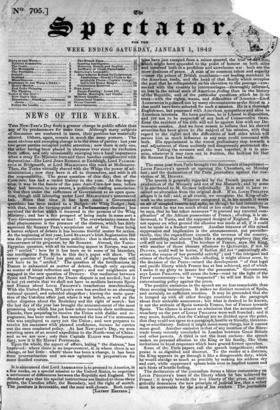NEWS OF THE WEEK.
Tins New-Year's Day finds a greater change in public affairs than any of its predecessors for some time. Although many subjects of discussion are unaltered in name, their position has materially altered. Others, again, remain in much the same posture. The most obvious and sweeping change is in the state of parties : last year two great parties occupied public attention; now there is only one, the other having been placed in abeyance ever since its exclusion from office, and only occasionally emerging into a local importance -when a stray Ex-Minister here and there bandies compliments with deputations—like Lord JOHN RUSSELL at Endsleigh, Lord PALMER- srox at Bridgnortb, or Lord MELBOURNE this week at Melbourne. Then, the Tories virtually shared with the Whigs the power of ad- ministration ; now they have it all to themselves, and with it all the responsibility. The great question of this day, that of the Corn-law, has had a varied history in the year. At the begin- ning, it was in the hands of the pure Anti-Corn-law men, before they had become, to any extent, a politically-trading association. It was then under the sufferance of Government as an open ques- tion, though still labouring under Lord MELBOURNE'S unretracted ban. Since that time it has been made a Governtneut question ; has been tacked to a Budget—the Whig Budget ; has, svith that, been the turning-point of a Parliamentary election ; has survived the defeat which it incurred in the persons of the Whig Ministry ; and has a fair prospect of being made in some sort a Tory-Government question at last ! The overwhelming reason for that phmnomenon is the pressure of the distress, which has fairly squeezed Sir ROBERT PEEL'S scepticism out of him. From being a barren subject of debate it has become fruitful matter for action. At the beginning of last year, Lord STANLEY'S Irish Registration Bill was the prominent topic of home politics : that is shelved, with the concurrence of its projector, by Sir ROBERT. Abroad, the Turco- Egyptian question, with all its menacing aspect in Europe, was not yet " settled " : how far it has been so in some of its branches, our intelligence from Syria in this day's paper will show. The newer question of Tunis has gone out of sight : perhaps that will yet have to be " settled." The question of the fortifications in France is exhausted as matter of debate, though only opening as matter of bitter reflection and regret ; and our neighbours are engaged in the new question of DUPOTY. Our mediation between Spain and Portugal about the Douro dispute is not needed ; but it is not yet certain that we shall not have to mediate between Spain and France about Louis PHILIPPE'S treacherous matchmaking. With the United States, M'Leoo's case has swelled to an alarming national quarrel, and subsided altogether ; leaving the main ques- tion of the Caroline affair just where it was before, as well as the other disputes about the Boundary and the right of search: but the last day of the year has brought the announcement of the most promising step which has yet been taken towards their settlement. Canada, then preparing to receive the Union with dislike and re- pugnance, has been united ; has mourned the loss of the statesman who was employed to carry out the Union ; and now prepares to receive his successor with pleased confidence, because he carries out the once combated policy. At last New-year's Day, we were awaiting news of an armed expedition to the North-west of China : and so we are now...; only then Captain ELLIOT was Plenipoten- tiary, DORY it is Sir HENRY POTTINGER.
Upon the whole, the aspect of affairs, bating" the distress," has improved : where there is no improvement, it is where there is no change, or but little : where there has been a change, it has been from procrastination and see-saw agitation to preparatives for more decided courses.































 Previous page
Previous page